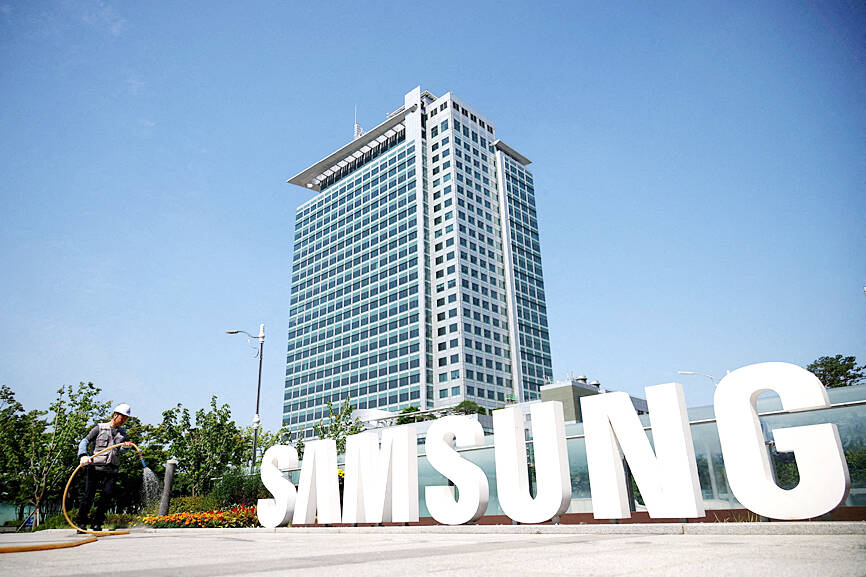US President Joe Biden’s administration plans to announce next week that it is awarding more than US$6 billion to South Korea’s Samsung Electronics Co to expand its chip output in Taylor, Texas, as it seeks to ramp up chipmaking in the US, two people familiar with the matter said.
The subsidy, which is to be unveiled by US Secretary of Commerce Gina Raimondo, would go toward the construction of four facilities in Taylor, including one US$17 billion chipmaking plant that Samsung announced in 2021, another factory, an advanced packaging facility and a research and development center, one of the sources said.
It would also include an investment in another undisclosed location, the source said, adding that Samsung would more than double its US investment to more than US$44 billion as part of the deal.

Photo: Reuters
The US Department of Commerce and Samsung declined to comment on the matter.
One of the sources said it would be the third-largest subsidy of the program, just behind Taiwan Semiconductor Manufacturing Co (TSMC, 台積電), which was awarded US$6.6 billion on Monday and agreed to expand its investment by US$25 billion to US$65 billion, and to add a third Arizona factory by 2030.
The announcement would cap off a string of major CHIPS and Science Act grants in quick succession as the US seeks to expand domestic chip production and lure away capital that might have been used to build plants in China and the region.
The US’ share of global semiconductor manufacturing capacity fell from 37 percent in 1990 to 12 percent in 2020, the Semiconductor Industry Association has said.
The US Congress in 2022 passed the CHIPS Act to boost domestic semiconductor output with US$52.7 billion in research and manufacturing subsidies. Lawmakers also approved US$75 billion in government loan authority, but one of the sources said Samsung does not plan to take any loans.
Biden would not attend the event, the two sources said.
He faces a tough fight to win a second term in November against former US president Donald Trump.
Texas Governor Greg Abbott, a Republican, was invited to attend, one of the sources added.
While TSMC and Intel Corp, which was awarded US$8.5 billion to expand its US chip output last month, are to expand production in the key swing state of Arizona, Samsung’s expansion in reliably Republican Texas is seen as less likely to help Biden during the election.

SEEKING CLARITY: Washington should not adopt measures that create uncertainties for ‘existing semiconductor investments,’ TSMC said referring to its US$165 billion in the US Taiwan Semiconductor Manufacturing Co (TSMC, 台積電) told the US that any future tariffs on Taiwanese semiconductors could reduce demand for chips and derail its pledge to increase its investment in Arizona. “New import restrictions could jeopardize current US leadership in the competitive technology industry and create uncertainties for many committed semiconductor capital projects in the US, including TSMC Arizona’s significant investment plan in Phoenix,” the chipmaker wrote in a letter to the US Department of Commerce. TSMC issued the warning in response to a solicitation for comments by the department on a possible tariff on semiconductor imports by US President Donald Trump’s

The government has launched a three-pronged strategy to attract local and international talent, aiming to position Taiwan as a new global hub following Nvidia Corp’s announcement that it has chosen Taipei as the site of its Taiwan headquarters. Nvidia cofounder and CEO Jensen Huang (黃仁勳) on Monday last week announced during his keynote speech at the Computex trade show in Taipei that the Nvidia Constellation, the company’s planned Taiwan headquarters, would be located in the Beitou-Shilin Technology Park (北投士林科技園區) in Taipei. Huang’s decision to establish a base in Taiwan is “primarily due to Taiwan’s talent pool and its strength in the semiconductor

An earnings report from semiconductor giant and artificial intelligence (AI) bellwether Nvidia Corp takes center stage for Wall Street this week, as stocks hit a speed bump of worries over US federal deficits driving up Treasury yields. US equities pulled back last week after a torrid rally, as investors turned their attention to tax and spending legislation poised to swell the US government’s US$36 trillion in debt. Long-dated US Treasury yields rose amid the fiscal worries, with the 30-year yield topping 5 percent and hitting its highest level since late 2023. Stocks were dealt another blow on Friday when US President Donald

UNCERTAINTY: Investors remain worried that trade negotiations with Washington could go poorly, given Trump’s inconsistency on tariffs in his second term, experts said The consumer confidence index this month fell for a ninth consecutive month to its lowest level in 13 months, as global trade uncertainties and tariff risks cloud Taiwan’s economic outlook, a survey released yesterday by National Central University found. The biggest decline came from the timing for stock investments, which plunged 11.82 points to 26.82, underscoring bleak investor confidence, it said. “Although the TAIEX reclaimed the 21,000-point mark after the US and China agreed to bury the hatchet for 90 days, investors remain worried that the situation would turn sour later,” said Dachrahn Wu (吳大任), director of the university’s Research Center for